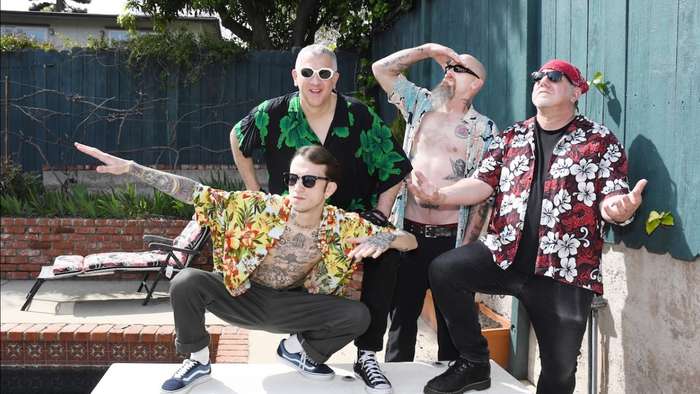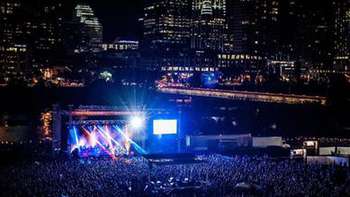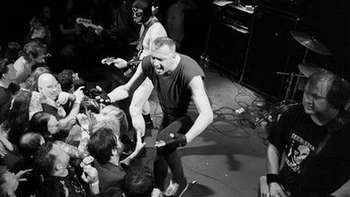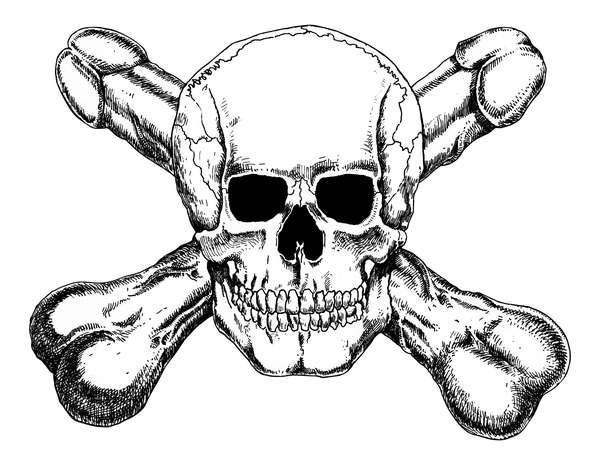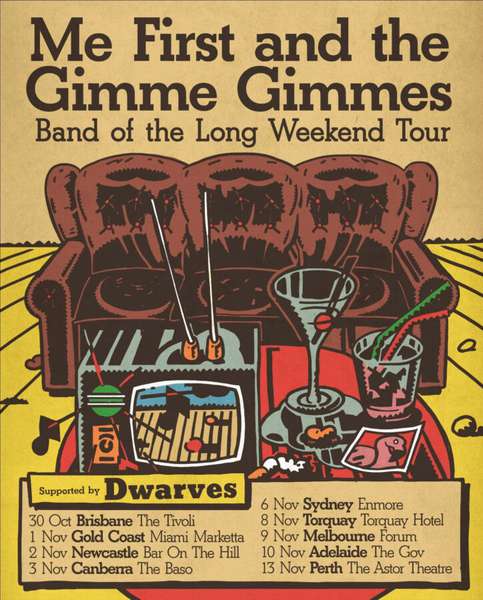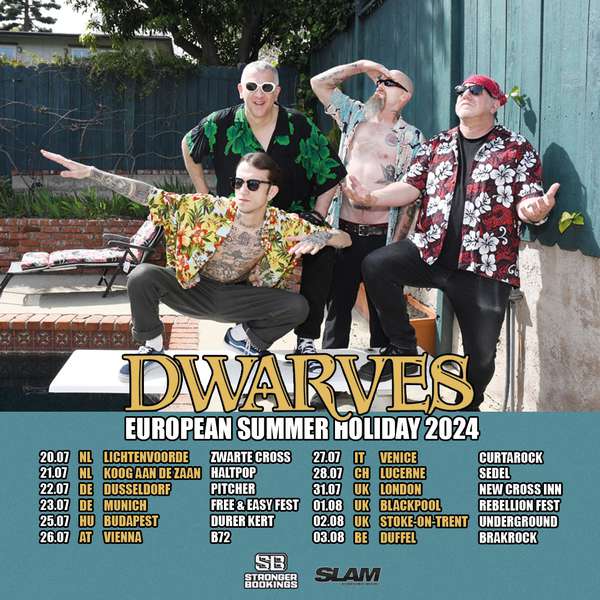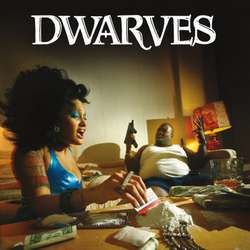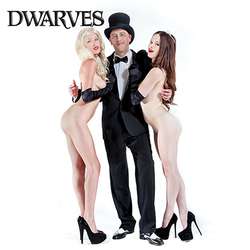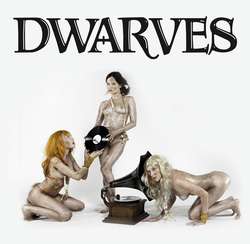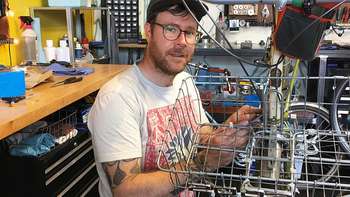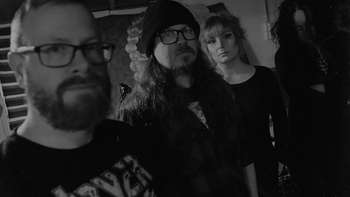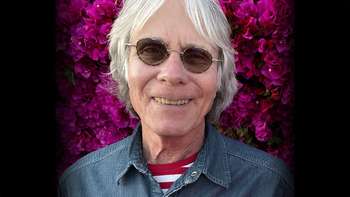The secret is now out: Blag Dahlia makes a mean omlette! A really mean omlette. Over breakfast, I had the opportunity to speak to Blag about the recent Dwarves LP, his alter ego Ralph Champagne, cancel culture, the music business, musical influences and spatterings of random thoughts. Put your order in, get the bacon frying, drop the eggs and toast and fill your cup with a double expresso with frothed milk - hold the sugar. Dig in!
Scene Point Blank: Is this a bad time for you?
Blag: No, it's okay. You will hear me making breakfast at 2 in the afternoon, haha. I have to get on the road soon though.
Scene Point Blank: You go on tour soon, don’t you?
Blag: Well, we have a bunch of shows coming up with Bad Religion next week, so I'm heading to L.A. I'm going to work on some studio stuff and rehearse with the band. And then, yeah, we have a bunch of shows with Bad Religion, so we're pretty stoked about that.
Scene Point Blank: I take if you have played with them prior.
Blag: Yeah, but only at festivals and stuff. We never got to do a little run with them.
Well, we were on Epitaph Records years ago, which was started by the Bad Religion guitarist Brett Gurewitz -- although I don't know that he'll be on this tour. I don't think he tours around with them too much, but it should be pretty fun regardless.
Scene Point Blank: Is this tour testing out some of the material on the new release, The Concept?
Blag: The way we do it is we do a couple of songs from every record. You know, sometimes you see bands and it's like people kind of only want to hear the old songs.
We have managed to make a pretty consistent sound and have evolved a lot as we make a lot of different styles of music on record, but live it's pretty much what you see is what you get, so stuff from all the different records works -- we just do our more our hardcore, up-tempo stuff live.
It works pretty seamlessly, like we've been doing songs from the Concept Album for the last half a year and it works great in the set. There's going to be new stuff and old stuff. It all kind of works together.
Scene Point Blank: Do you do stuff from your very first album, Horror Stories on Voxx?
Blag: You know, that's the one record that kind of gets forgotten. We do, however, do some pre-Blood, Guts & Pussy stuff like “Free Cocaine” and stuff like that. But yeah, that first kind of psychedelic, garage rock record that we did for Voxx, we don't do that live and it's because that was very keyboard based and we don't have a live keyboard player.
Scene Point Blank: That was my first Dwarves record. I didn't know who you guys were at the time. I just picked it up because I used to buy a lot of that garage stuff off that label and others. I kind of forgot about you and then a friend said, Hey, have you heard this band called the Dwarves? And I said no, I don't think so. I think it was Blood Guts & Pussy..I'm like, wait a minute I know these guys but man they have changed a lot.
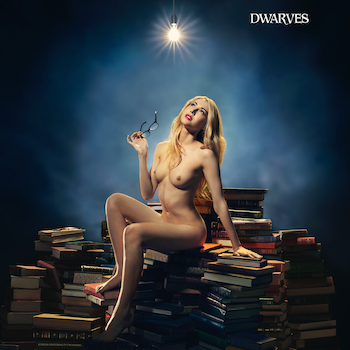 Blag: Again, it's funny because we kind of get a rep for, like, “Ohh these old guys, here they come again with their same old schtick.” And it's like there's never been a band that changes as much as us. You know what I mean? We fucking change radically: We go from wildly overproduced stuff with session guys and big producers to like, nasty garage shit with no production value at all and then we go from the ‘60s to rockabilly to hardcore to pop-punk to surf to noise stuff. However, when people talk about the band, they very rarely talk about that side of it because it doesn't seem like a band that evolves to some, because there are always tits on the cover. So it's like, “Oh, yeah, we know what this is. It's always the same.”
Blag: Again, it's funny because we kind of get a rep for, like, “Ohh these old guys, here they come again with their same old schtick.” And it's like there's never been a band that changes as much as us. You know what I mean? We fucking change radically: We go from wildly overproduced stuff with session guys and big producers to like, nasty garage shit with no production value at all and then we go from the ‘60s to rockabilly to hardcore to pop-punk to surf to noise stuff. However, when people talk about the band, they very rarely talk about that side of it because it doesn't seem like a band that evolves to some, because there are always tits on the cover. So it's like, “Oh, yeah, we know what this is. It's always the same.”
Scene Point Blank: How many actual members have been in the Dwarves in totality? Do various members change the Dwarves' sound?
Blag: Well, yeah and not just different people playing but different people writing. I'm a songwriter, it's kind of the main thing I do and so a lot of times when a songwriter is leading the band, it's like, “Okay, we're going to do all my songs.” But I always felt like that's why most bands were boring. First, you get the guy's Best Song and then you get his second Best Song and then by the end, you've got his worst song and that's your record, . However with us, it's like you get 2-3 songs from every guy and it's all our best songs. We make consistent, weird records because I have different people playing and different people writing all the time. So to answer the question, there's probably been like 20 different people if you count different people who are in live versions of it -- maybe even 25. You kind of had the early band, which was me, Salt Peter, and HeWhoCannotBeNamed, and that was the basis of it. Then when Vadge came in for Blood, Guts & Pussy it really solidified and I was like, “Okay, this is the band.” The next guy who came in and made a difference was Nick Oliveri. We took Kyuss on their first tour and when I first met Nick we had a guitar player named Holy Smokes, who was the first guy to kind of play in that heavy metal style that the Dwarves had never really had prior to that. So he was important and then The Fresh Prince of Darkness came. He's sort of a complete guitar player who can play in all these different ways and writes well. So he is really essential to it.
Then we had various drummers and one of them for the last 20 years, on the records, is Josh Freese, who now is in the Foo Fighters. He's just an amazing, like, session-quality guy, you know? But lately we have gotten these young drummers, that are good, from thrash bands. We got Snupac (who is the new guy). He comes from a band called Get a Grip. We met him when he was 12 years-old when he was sitting in the audience when we played at Punk Rock Bowling He knew every word to every song and I started handing him the mic and finally, I just brought him up on stage and this kid was 12 years-old and he knew every song and he had great stage presence. We always kept in touch and became friends. Then at some point a few years ago, he said, hey, I think I could play drums for the Dwarves and I’m like, you know, man, I'm kind of a picky bastard and I'm used to playing with, like, Josh on records and shit and like, you know, I'm just gonna hate your drumming, haha. And then he came in and he was great! To answer the question, there are some kind of main guys and then there are some kind of side guys, but everybody kind of gets a shot and adds something.
Scene Point Blank: I got curious about how old you are and discovered we are pretty much the same age. The thought only occurred to me after listening to your solo record (Ralph Champagne) and wondered what you grew up listening to and if our upbringing, musically, was similar.
Blag: My family loved music. My dad was really into the American songbook. He collected sheet music and wound up with like 20,000 sheets. So he loved all the obscure American, Tin Pan Alley stuff. I grew up going to see musicals with my parents and getting bit parts in the musicals and stuff so we were big on the basic American songbook, but then also my dad was big on, like, marches. I had an older brother who was really into sophisticated, weird avant-garde jazz. Everything was John Coltrane, Miles Davis, and Roland Kirk. So then there was just what was on the radio when I was a kid. The radio was much less segregated then, and so you'd hear “Backstabbers” by the O'Jays and then “Crocodile Rock” by Elton John. I grew up in a very omnivorous musical environment. I never really paid attention to what's popular right now or what's going on.
Scene Point Blank: Yeah, I didn't either. I mean, I totally get that concept. It was just kind of what I was exposed to or what people exposed me to. My aunt was exposing me to Brian Eno and Klaus Nomi and stuff like that. I was just a weird kid who just kind of liked a little bit of everything: reggae and whatever. I grew up in small towns and kind of pieced my music together. It's different now. Kids can just type anything on the internet and find any type of music that they want, but back then it was kind of word of mouth. So I went from classic rock to, when someone introduced me to Motörhead I'm like, “Jesus, these guys are fucking wild.” Then I started picking up Clash records and early punk records and such.
Blag: When I started high school, I suddenly got a crash course from this guy who was a senior. I was a freshman. And he used to pick me up and hitchhike to school. That was back when people hitchhiked and he turned me on to The Velvet Underground and, from there, all the ‘60s garage bands through Nuggets and that kind of stuff. So when I heard that, I really took to it and I was like, “Wow, this is unique and cool.” I was like 20 years-old then so it was cool and retro and nobody knew about it. There was no internet where you find out about this shit. From there I got into rockabilly records and stuff like that, and then I saw Decline of Western Civilization and that was the sort of my introduction to punk. I mean, I'd seen stuff on Saturday Night Live or videos of Sid Vicious doing “My Way,” Devo, etc. My freshman year, I was just really big on ‘60s garage and rockabilly all at the same time. That is the magic brew that is the Dwarves. We play punk, but all it is like a sped up form of rockabilly. Over the years, I've added more members that were more oriented toward heavy metal and things like that -- and so that makes an appearance in the Dwarves -- but it was never really my thing. However, I like the way it fits into the overall tapestry of it: little bits of this and that. So yeah, man, I mean, just very omnivorous, musically. So the basis of the Dwarves is definitely rockabilly, ‘60s garage, and punk rock.
"[People] very rarely talk about that side of it because it doesn't seem like a band that evolves to some, because there are always tits on the cover."
Scene Point Blank: I have a friend who considers rockabilly the purest form of rock ‘n’ roll music there is. He has been shooting out these names to me of all these obscure and not-so-obscure rockabilly cats. I have been drawing little parallels; as you check out more music you start digging farther and farther back. So I appreciate that whole thing around who influenced whom.
Blag: Yeah. And of course, you know when you say, like, rockabilly is the purest one; well, maybe it's the purest form of rock ‘n’ roll, but that's the whole thing. Rock ‘n’ roll from the beginning was a synthesis, right? So if you look at rockabilly and what it is, it's like equal parts. White folks, country, folk music, and black folks, you know, and blues and R&B and then just general pop music. When you add the three together, you get Elvis, you get rockabilly, and you get rock ‘n’ roll. People consider it pure ‘cause that's kind of where they stop. I know a lot of people who don't listen to anything pre-the ‘70s because their ear just isn't tuned to it and they just can't hear that. Then some people who go back to the ‘50s and so they can't listen to anything but that era. There's music that precedes that, right? The American folk music, ragtime music, slave chants and field hollers. I mean, you could always go back farther and farther and farther and find this shit and so really, I think that's how you get to the modern Dwarves, where it's just like a big synthesis of every conceivable style and every different way of doing it and that's kind what we evolved into. Although I am glad we always kept [a hardcore and the punk rock aspect to the sound as we grew up with that. As young kids we went to shows like Black Flag and the Dead Kennedys and the Misfits.
Scene Point Blank: Which state did you grow up in? Did you not all move to San Francisco at one point?
Blag: I've lived in San Francisco since 1986, so I really consider us a San Francisco band but it's funny because there hasn't been anybody else but me in the band from San Francisco for 20 years -- they're all LA guys. The Dwarves started in Chicago. We played our first gig in Chicago. I'm from Illinois. I grew up in Illinois in the suburbs. My first like club gig was at Cubby Bear Lounge across the street from Wrigley Field in Chicago. So I came up as the '60s garage kid into the Chicago punk scene.
Scene Point Blank: So would that be around the time when you were seeing bands like The Effigies and Naked Raygun?
Blag: I saw Effigies and Naked Raygun many times, but usually opening for bands. Rights Of The Accused was another one. They were our punk/ska thing. I absolutely saw all those bands, but usually, it'd be because they were opening for somebody I'd heard of, like the Dead Kennedys, or Black Flag, or someone like Fear.
Scene Point Blank: Going back to that early songbook stuff that you said your dad introduced you to: Would that be stuff like Alan Lomax or Harry Smith?
Blag: No, but I love that stuff. Lomax was a guy that recorded fuckin’ shit like Robert Johnson and Son House and Charlie Patton. I'm into that. That's that mid ‘20s to mid ‘30s early blues and folk stuff. I mean, Lomax is a very important character, but no, my dad wasn't that obscure. He liked the pop songs. He liked, you know, Frank Sinatra and Doris Day and Tony Bennett and blah blah, that kind of stuff. The hit songs of the day, what they called the hit parade back then.
Scene Point Blank: That's what I grew up on with my father too. It was like Frank Sinatra, Duke Ellington, Ella Fitzgerald. All that type of stuff. He had some weird jazz records, like guys named Keith Jarrett, which to me as a kid sounded like someone let a cat on a keyboard or something,
Blag: Yeah, Keith had those solo piano things. My brother was into that because he was like a jazz hipster guy.
Scene Point Blank: When I listened to your Ralph Champagne release I wondered if stuff like that influenced you in making the record.
Blag: Yeah, absolutely.
My dad's name is Ralph, so it was kind of a tribute to him, but I actually stole that fake name from Josh Freese. He used to call himself Ralph Champagne. I was like. “I'm totally stealing that,” haha. The Ralph Champagne record was interesting because I went in working with this producer. His name is Andy Carpenter and I said, “Hey, I'm just gonna play all these songs for you and I want you to help me figure out like, what key are they are in? What time signature should I use and what should I do with this?”
I played about 25 songs and then we went through them. Ralph Champagne wound up being kind of the country-inflected side of it. Interestingly, I leaned towards that angle as I didn't grow up with country music. That was something that I figured out later, as I said, like when I got really into rockabilly then it was like, well, what does this come from? I grew up during sort of a golden age of modern country in the ‘70s with George Jones and Dolly Parton and stuff. I was kind of oblivious to that at the time but later I realized how great that stuff was. And so that Ralph Champagne record turned out to be very country or rockabilly inflected, However, the duet on there almost sounds like Captain and Tennille, like “Elementary Love Song.” Then there is stuff on there that's more loungey. Ralph Champagne is already stretching out to different genres, but that first one is pretty country. The Ralph Champagne I'm working on now is some of the rest of those songs and it's going in different directions. It is a little Broadway and it's a little jazzy and it's weird. I don't even know what the fuck it is. But yeah, it is kind of synthesis of stuff that…there are some melody approaches that just would never work with the Dwarves as the Dwarves are maximum noise: loud and hard.
Scene Point Blank: I was expecting it to be like what you just said: lounge, with the name Ralph Champagne! I put it on and I thought, “Wow, this is a lot more country than I actually thought it would be.”
However, like you, I drew those parallels from country to someone like Carl Perkins.
What were people's reactions to the album? I don't know if people are that open-minded these day. They think of you as the singer of the Dwarves playing punk and then you hit them with good ol’ Ralph Champagne!
Blag: It's that kind of record. Some people were just like, “Dude, this is fucking genius. This is amazing. I can't believe this. This is 180 degrees different. I never expected this. I love this.”
However, to be honest, most people just never noticed it. Never heard it. I mean, there is no live band to play Ralph Champagne. So I have no way of really promoting it. So in the absence of some big advertising blitz or marketing campaign I didn't have, you know, nobody really knows about that record. So I don't even think people were like, “Hey, I'm pissed about this!” It was more like fucking people just don't know that it exists. It's one of those records that has fallen through the cracks up until now, and I just think it's going to be one of those records that kind of has a life of its own. It never gets to be a huge record, but it'll just kind of live forever because it's such a unique, cool record. I'm going to try and make a couple more records like that, and eventually get some mechanism for playing it live so I can bring it to people and then I think people will pay more attention.
It's tough to mount a new project. Obviously, it wasn't a Dwarves record so it had to have a different name. However, then a guy like you who cares about music: you go, “Fuck, that was interesting.” That's kind of what happened with that record.
